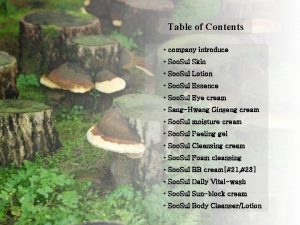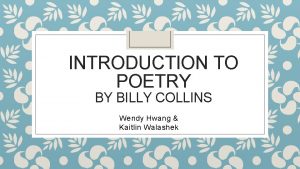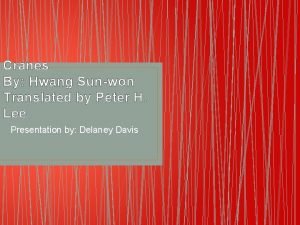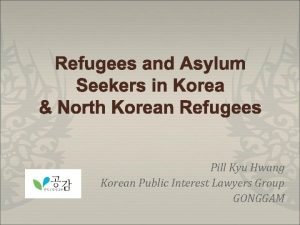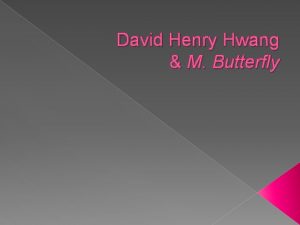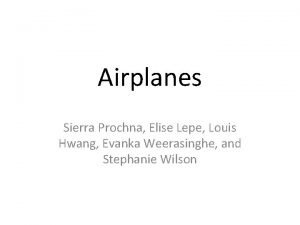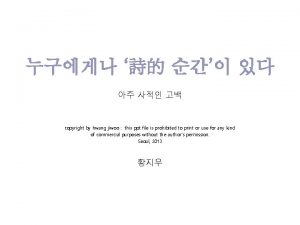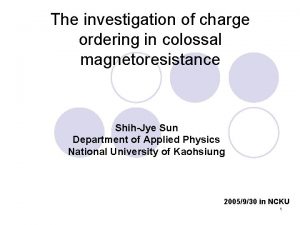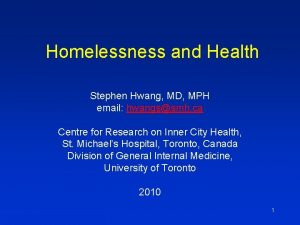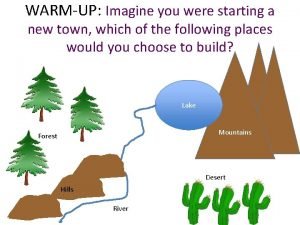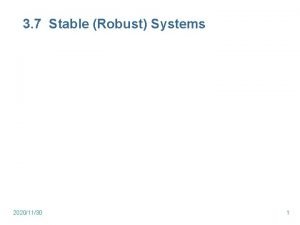20201130 WenShann Hwang 1 2007510 2 20201130 WenShann








































































- Slides: 72

2020/11/30 Wen-Shann Hwang 1

2007/5/10 2

2020/11/30 Wen-Shann Hwang 3

Chapter 0852 Subjunctive Verbs

Forms of English tenses voices Verbs moods indicative imperative subjunctive

Conditional Sentences Structure : A conditional sentence is composed of 2 parts : If-clause + Main Clause Example : If it rains tomorrow, we will not come. If-clause Main Clause

Conditional Sentences Type 0 : Use : Tense : Example : Talk about universal truth. Present tense in both clauses Present Tense If you heat water to 100°C, it boils. If you pour oil into water, it floats.

Conditional Sentences Type 1 Use : Tense : Talk about a present or future probable case. If-clause ~ Present Tense Main Clause ~ Future Tense Example : Present Tense Future Tense If I feel sick, I will not go to school. If it rains tomorrow, the match will be cancelled.

Exercise One 1. do not (not come), If you __________ You ________ (miss ) the show. will miss 2. will buy John _________ (buy)a car if he _______ (get)a job. gets 3. gets Mary ________(get) a toothache if she_________ eats(eat) too many sweets.

Conditional Sentences Type 2 (Present Subjunctive) Use : Tense : Talk about a present or future improbable case. (A case that is unlikely to happen) If-clause ~ Past Tense Main Clause ~ would + an infinitive Example : Past Tense Would + infinitive If he were a bird, he would fly across the harbour. If I had $200, 000 now, I would buy a car.

Conditional Sentences Type 3 (Past Subjunctive) Use : Tense : Talk about a past, impossible case If-clause ~ Past Perfect Tense Main Clause ~ Would + Present Perfect Form Example : Past Perfect Tense Would + Present Perfect Form If I had enough money, I would have bought the camera yesterday. If I had come home earlier, I would not have missed the programme.

Exercise Two were If I ________ (be) four years old, I 1. ________ (learn) to play the piano. would learn 2. had not failed If I ________ (not fail) in the examination, my mother________ would (buy) have bought me a new computer. would have finished 3. We ____________ (finish) if we ________ (have) better preparation. had

Conditional Sentences Variations: SHOULD may replace IF in type 1 Type 1 : If you see John, ask him to come and see me. Should you see John, ask him to come and see me. Type 2 : COULD or MIGHT may replace WOULD If I were an aeroplane, I could fly in the sky. Were I an aeroplane, I could fly in the sky. WERE may replace IF in an inversion

Conditional Sentences Type 3 : If I had come home earlier, I would not have missed the programme. Had I come home earlier, I would not have missed the programme. HAD may replace IF in an inversion

Conditional Sentences Type 2 & Type 3 : But for+ a noun may replace `If it were not for’ If it were not for the rain, we would go to Shatin. (Type 2) But for the rain, we would go to Shatin. If it had not been for the traffic jam, we would have arrived on time. (Type 3) But for the traffic jam, we would have arrived on time. But for + a noun may replace `If it had not been for’

The Subjunctive Mood Other sentences than the conditional may bear the subjunctive mood. a. Wish (v) Type 2 I wish I were a king. Type 3 (But I am not!) I wish she had left last night. * Non-subjunctive use of wish Ø I wish to travel to Europe next year Ø We wish you a happy birthday. (But she didn’t!)

The Subjunctive Mood b. If only Type 2 If only I were you! If only he were born in the USA! If only she had left last night! Type 3 (He was not born in USA) (She did not leave last night)

The Subjunctive Mood Type 2 b. Would rather I would rather you came earlier. (But you come late. ) Type 3 I would rather he had told me the secret. * Non-subjunctive use of would rather A : Do you want to go fishing today? B : I would rather stay at home and take some rest. (B prefers staying at home to going fishing) (But he didn’t. )

The Subjunctive Mood d. Lest (Conjunction) He put the money in the safe lest someone should / might steal it. e. It is (high) time Past Tense Ø It is (high) time you studied hard. (You have not studied hard. Now the examination is near, so you have to study very hard. ) Ø It is time for you to leave (non-subjunctive)

Function The subjunctive mood is used in dependent clauses that do the following: 1. express a wish; 2. begin with if and express a condition that does not exist (is contrary to fact); 3. begin with as if /as though when such clauses describe a speculation/condition contrary to fact; 4. begin with that and express a demand, requirement, request, or suggestion. A new section on the uses of the conditiona should help you understand the subjunctive.

She wishes her boyfriend were here. If Juan were more aggressive, he'd be a better hockey player. We would have passed if we had studied harder. He acted as if he were guilty. I requested that he be present at the hearing.

Subjunctive Verbs We call following Vs subjunctive verbs. Usually we use subjunctive Vs with ‘that clause’ ask, propose, suggest, command, recommend, decree, desire, request, insist, require, order, prefer, stipulate, urge * Sometimes the V ‘insist’ may be used in nonsubjunctive Vs

Usage(1/3) The Indonesian prime minister ordered that the army retain control of the situation. The lawyer requested that the court deny the evidence. The archaeologist requested that the government support the excavation of buried ancient city. The France proposed that his name be engraved on the statue.

Usage(2/3) The government refused the request that the labour party suggest. They ignored the suggestion that she get more practice. The king commanded that the knight go on a quest. The king desired that the knight go on a quest. I suggest that you be a little quieter.

Usage(3/3) I move that the bypass be routed east of town. The manager insisted that he finish the work. The general commands that you be present at the meeting tomorrow. I propose that we take a break.

Subjunctive N clause(1/3) Certain expressions (of urgency) are also followed by that + the subjunctive: It is/was/will be advisable/necessary/recommended/ urgent/important/mandatory/proposed/required/ suggested/urgent/imperative/desirable that (subject) verb in the base form (. . . ) It is recommended that every body study this carefully.

Subjunctive N clause(2/3) it is advisable/critical/desirable/essential/fitting /important/necessary/vital + that…. It is essential that you be present. It is necessary that everyone leave now. It was vital that he see the president. These structures are more common in American English. In British English, people usually use other structures, especially should + infinitive: I propose that we should take a break. It was vital that he should see the president.

Subjunctive N clause(3/3) It is imperative that you get home before dark. It is important that everyone follow the rules. It is necessary that everyone be calm in times of danger. It is essential that you arrive before 5 pm. It is critical that the prime minister address those sensitive issues. It was vital that everything be done on time. It is crucial that we make it successful. 28

Nouns used with Subjunctive There also nouns that can be followed by a subjunctive verb, like advice, condition, demand, directive, intention, order, proposal, recommendation, request, suggestion, wish. My advice is that the company invest in new equipment. She is free to leave, on condition that she commit no further offence. His deep wish is that his daughter go to university. 29

Less Formal Usage There are several alternatives to the very formal standard subjunctive: ★ should This construction is more common than the subjunctive in British English: Tom suggested that his friends should stay overnight. She recommended that he should go and see his doctor. 30

★ The Indicative This construction is also used sometimes in British English, but is rare in American English: She has demanded that the machinery undergoes vigorous tests to ensure high quality. It is imperative that more decisions are made by the shareholders 31

★ For + Infinitive It is essential for everyone to be informed of the new regulations. ★ No Tense Change In colloquial English, it is possible to not make a tense change: She demanded that he left. She felt that it was necessary that she wrote a thank you letter to them. 32

She insists that her son attends private schools to ensure getting the best education possible. (used in British English) She insists that her son should attend private schools to ensure getting the best education possible. (used in British English) She insists that her son attend private schools to ensure getting the best education possible. (used in American English) 33








可能的現在或未來 If it rains tomorrow, I will not go mountain climbing. If Tom comes, tell him to wait for me. 41


43

現在該…… It's time that I picked up my daughter. It's high time we were going. 從屬子句 It is + (high) time 44 主要子句 that were + should + 原V

It is necessary (important, natural, strange, etc. ) that we should clean the room every day. It was a pity (a shame, no wonder, etc. ) that you should be so careless. It will be desired (suggested, decided, ordered, requested, proposed, etc. ) that she should finish her homework this afternoon. 45

It is necessary (important, natural, strange, etc. ) that we should clean the room every day. It was a pity (a shame, no wonder, etc. ) that you should be so careless. It will be desired (suggested, decided, ordered, requested, proposed, etc. ) that she should finish her homework this afternoon. 46

【My/Our】+ advice【V that S (should) + 原V】 advice, idea, order, demand, plan, proposal, suggestion, request His suggestion that we (should) go to Shanghai is wonderful. My idea is that they (should) pay 100 dollars. 47

When I go shopping, I’ll buy some fish. (I’m going shopping this afternoon, this is sure to happen. ) If I go shopping, I’ll buy some clothes. (I might go shopping, this will possibly happen. ) 48

Complementation by a finite clause The conjunction in that-clauses which function as object may be zero, as in “I hope he arrives soon” But when the clause is made passive, the “that” cannot be deleted, and thus obeys the same rules as other “that” –clauses as subject. The normal passive analogue has “it” and extraposition, “that” 49

Everybody hoped (that) she would sing. (O) That she would sing was hoped by everybody. (X) She would sing was hoped by everybody. (O) It was hoped by everybody (that) she would sing. “that-clauses” have one of three types of verb phrase, depending on the ‘governing’ verb in the matrix clause: 50

(1) indicative verb: I suppose that he is coming alone. will be coming alone. will come alone. has come alone. (2) putative ‘should’: I regret that he should be so stubborn (3) subjunctive verb: I request that she go alone. 51

2020/11/30 Wen-Shann Hwang 52

2020/11/30 Wen-Shann Hwang 53

2020/11/30 Wen-Shann Hwang 54

2020/11/30 Wen-Shann Hwang 55

2020/11/30 Wen-Shann Hwang 56

2020/11/30 Wen-Shann Hwang 57

2020/11/30 Wen-Shann Hwang 58

2020/11/30 Wen-Shann Hwang 59

2020/11/30 Wen-Shann Hwang 60

2020/11/30 Wen-Shann Hwang 61

2020/11/30 Wen-Shann Hwang 62

2020/11/30 Wen-Shann Hwang 63

2020/11/30 Wen-Shann Hwang 64

2020/11/30 Wen-Shann Hwang 65

2020/11/30 Wen-Shann Hwang 66

2020/11/30 Wen-Shann Hwang 67

2020/11/30 Wen-Shann Hwang 68

2020/11/30 Wen-Shann Hwang 69

2020/11/30 Wen-Shann Hwang 70

2020/11/30 Wen-Shann Hwang 71

2020/11/30 Wen-Shann Hwang 72


